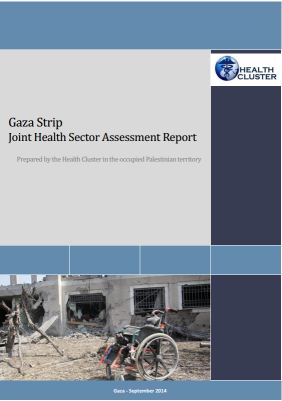 Read the Gaza Strip joint health sector assessment report 12 October 2014 – Urgent work is needed to rehabilitate the damaged health system in Gaza to prevent further loss of life after the recent conflict, according to a WHO-led joint assessment of health needs and services in Gaza, released today.
Read the Gaza Strip joint health sector assessment report 12 October 2014 – Urgent work is needed to rehabilitate the damaged health system in Gaza to prevent further loss of life after the recent conflict, according to a WHO-led joint assessment of health needs and services in Gaza, released today.
During the conflict more than half of existing hospitals and health centres were damaged or destroyed, and over 11 000 people were injured, putting immense strain on remaining facilities. The assessment found critical shortages of essential medicines and other supplies, medical equipment out-dated or in need of repair, health staff unpaid and in need of targeted trainings, and an urgent need to ensure sufficient fuel supply for generators at health facilities.
“The health system in Gaza was already on the brink of collapse after decades of occupation, and years of blockade and conflict,” WHO Regional Director for the Eastern Mediterranean Dr Ala Alwan said. “We need sustained interventions to repair and rehabilitate the damage done during the conflict, and to strengthen the health system for the future. Without this, more unnecessary loss of life will inevitably occur.”
Beyond those injured by violence, the assessment showed that during and after the conflict people with chronic health conditions such as cardiovascular disease, cancer and diabetes suffered from inaccessibility of services, shortage of drugs, and an increase in the demand for referrals outside of Gaza for patients who cannot receive adequate services in the Strip.
The assessment also warned of long-term increased demands on health services by more than 1000 patients who acquired long-term or permanent injuries in the conflict, and the anticipated increase in mental health needs such as post traumatic stress disorder and depression. (WHO estimates 20% of the population in emergency-affected areas will require some form of mental health intervention.)
"WHO is working closely with the Palestinian Ministry of Health to provide patients in Gaza with access to high quality health care. This will require sustained support from donors, and unimpeded access for medicines, essential supplies and medical equipment and reconstruction materials to enter Gaza,” said Dr Alwan.
WHO is supporting the following activities: repair and rehabilitation of 67 damaged hospitals and primary health centres; provision of quality essential public health services, including mental health; provision of essential medicines, especially for chronic illnesses; rehabilitation of the disease early warning system; coordination of the health sector and management of health information; facilitation of 2,000 referral patients per month for specialized medical treatment outside of Gaza.
Related link
Gaza Strip joint health sector assessment report
For more information please contact:
Wendy Bruere
Media and Communications Officer (Gaza Strip)
+972 598 944 627
email


